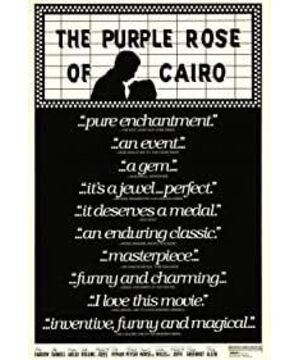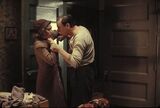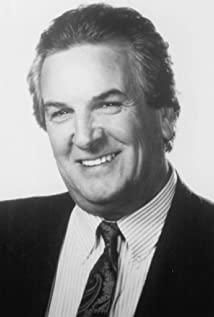This film tells a very old topic: the relationship between dreams and reality. The movie (expedition to Cairo) is a representative of dreams, and the protagonist's life (the Great Depression) is a symbol of reality. In order to clarify the boundary between dream and reality, the producers adopted different color schemes. Black and white represents dreams and color represents reality. Tom, the "man in the play" who came from dreams, has his costumes in black and white from beginning to end.
Some people may not believe what my dreams and reality refer to, and think that I forced them. I point out a detail. After Tom walked off the movie screen, what place did he choose as his own home? It is a playground. If the film is purely to create romance, it should be like in "My Savage Girlfriend", weave a very romantic and beautiful night in the playground, and the two people will enjoy the happiness brought by various entertainment facilities. But what about the facts? They did not get real happiness in the playground, a symbol of happiness in real life (I mean the people in the play did not get happiness, and their jokes make us laugh is another matter), truly unforgettable The night is spent in the world inside the movie screen (the heroine later emphasized this point). The beautiful dream is on the screen.
What is the director's attitude towards dreams and reality? In fact, it was clearly stated in the film shortly after the beginning of the film. Every time Cecilia ran away from home, her husband would always yell at the door, "Life is not a movie! You will definitely come back!" With his words, the director has clearly told us that dreams cannot overcome reality, no matter what Our dreams are so far away and beautiful. Finally, we must return to reality, return to life, and live our own lives down-to-earth. There is also a detail mentioned many times in the film. Every time the filmmaker in the film discusses a solution to the problem, he always mentions "turning off the projector", and also clearly tells us the director's vision and reality. manner. Turn off the projector, destroy the copy, and everything in the movie no longer exists-a simple action in real life can completely shatter the dream, and the actor is purely for his own benefit without any hesitation. There is no pity. Also, we can imagine what would happen if such a thing really happened in life. Then the main part of this movie should be to describe the crowds before the cinema. Everyone is vying to witness such a spectacle. There are huge crowds of scientists, policemen, and curious audiences. But in "Open", this is just a short comedy segment, and a large amount of the film describes the producer's panic. The film has appeared in movie theaters many times, and an obvious detail is that there are fewer and fewer people in the movie theater. Why do you shoot like this? Because secular people face the lofty and beautiful dreams of others, they are more fearful than greeted with open arms. It is more of numbness and habituation, rather than enthusiastic praise and envy. Having said that, it should be clearly pointed out that the ending of the film is doomed from the beginning. The ending of the separation is not made up by the director to force us to make us sad, but is determined by the theme of the film. Although this is a comedy, it is telling us the frustration of dreams in the face of reality. Woody Allen is a pessimist, this is his consistent style of movies.
Dreams are unrealistic and can easily be disrupted (the reaction of people in the movie after Tom walks off the screen); dreams can even deceive themselves and escape reality ("Why don’t we assume that we are real, but outside Everything is fake", the people in the movie said); but the value of dreams is that they aspire to become reality and want to change reality, so Tom walked off the screen and exhausted all his energy Go after your true love. When Cecilia faces the choice between Tom and Jill, when human beings face the choice between dream and reality, reason will make people choose reality. Because choosing a dream often means death (although this is not the case in the film), the deep meaning of the film determines that Cecilia's choice is Jill. And the ingenuity of the film is that there is a second layer of dream and reality choices: for Cecilia, Jill is also her dream, and her husband Munch is her reality. The dream left her. Jill left by plane, dream flew away. One is an active choice, the other is a forced choice, and the result of the choice is reality. The dream bubble is too fragile.
However, the film is not blindly pessimistic to the end, otherwise when Cecilia learns that Jill flew away, the film can end directly. After this, there are two more plots worthy of our attention: First, on the plane back to Hollywood, the brilliant golden sunlight came in from the window, Jill raised his head and looked out the window, bowed his head in contemplation; Second, Cecilia returned to the movie theater, Leaving moving tears at the end of the movie.
Does Jill like Cecilia? Anyone who has watched the film may come to the same conclusion as me. He didn't pursue Cecilia to drive Tom back to the screen. He is just a little actor, and Cecilia is his only soulmate. Her sincere praise and kind nature made him fascinated. Love is his dream. However, the reality is that for his future career, he cannot take her away. He must follow the planned plan and meet in Hollywood to grab the role of Lin Bai (this is explained many times in the film). On the plane, he looked out the window, missing Cecilia, lowered his head in thought, and blamed himself for his actions. If this is not the case, the director can arrange a shot in which he laughs, or simply omit this shot. Such brilliant golden light (the cabin is also very tidy), seems to have only appeared in the movie this time, in contrast to the dark movie theater, Cecilia's dim and chaotic home, a wolfish playground... It is very prominent. He also made a choice between dreams and reality.
Cecilia was finally moved by the movie. Regardless of how much the tears were about her experience, she was greatly moved and satisfied in the beauty of art. Dreams and reality always conflict like that. Are we really at a loss? Can we only be immersed in the despair of shattered dreams forever? No, we still have art. The enjoyment that art brings us can alleviate the suffering in reality; if a dream is broken, we still have other dreams. As long as the dream still exists, there will always be hope in life.
View more about The Purple Rose of Cairo reviews











